 Northern Ontario companies are joining forces to seek out business opportunities in Western Canada.
Northern Ontario companies are joining forces to seek out business opportunities in Western Canada.
Twenty businesses have united in a pan-northern initiative called the Western Canadian Business Opportunities Consortium under the auspices of Ontario's North Economic Development Corporation (ONEDC), a non-profit corporation representing the five Northern Ontario cities.ONEDC (pronounced One DC), created to implement pan-northern economic development initiatives, has been working with the support of the Ministry of Northern Development, Mines and Forestry (MNDMF) for the last three years participating in a national buyer/seller's forum in Edmonton, said Sudbury's economic development officer and project lead Paul Finley.Changing local markets and the strength of the uranium, potash and oilsands industries in Alberta and Saskatchewan have prompted the economic development corporations in Northern Ontario to make a more concerted effort to establish relationships in Western Canada and create a more permanent presence there. Consequently, an agent has been hired to gather intelligence and act as a representative to help make contacts with potential customers in Alberta and Saskatchewan. He will be stationed in Saskatoon."His job is to gain intelligence and provide information regarding potential opportunities, not to go out and make the deals," Finley said. "We have a series of marketing initiatives that, hopefully, will help support what the companies are doing, so when they go out to make their bids, they will be fully conversant, understand (the opportunity) and at least have a base-level relationship with the company."
This three-year initiative involves companies that work in environmental engineering, structural and metal fabrication, pressure vessels, and construction support services. An annual participation fee is required. Although the number of companies at this time is capped at 20, Finley said it is not a closed club. He anticipates that as companies establish and mature in business relationships, movement into and from the group will allow newer members to join.
Rigorous process
Finley said specific companies were recruited that had transferable skills and technologies and were interested in exploring business opportunities in Western Canada. He is aware that it will not be a slam dunk. Making inroads with multi-billion dollar companies in the oilsands is no easy task. There is a rigorous process required to obtain pre-qualification status before a company is even allowed to place a bid on a project.
Fuller Industrial Corporation, a Sudbury-based company specializing in rubber lining, pressure piping and pipe and fitting fabrication, is a shining example of a business that has succeeded in expanding to Western Canada.
"You have to be more than just an ISO-certified company," Finley said, emphasizing that companies must have all the health and safety certifications and a host of other proficiencies in place before they'll even look at you.
Norman Spence, field operations manager, Fuller Western Rubber Linings Ltd., has an intimate knowledge of the process required to do business with the big players.
A newcomer must fill out a pre-qualification package obtained from the company's purchasing department, answering a range of questions from the type of equipment used and the company's insurance, to employee qualifications. Once completed, it is sent back for approval.
"When you get approved, they tell you what you can and cannot bid on," Spence said.
If given the green light, the company will send an auditor on site to look at the processes, quality control programs and the paperwork that accompanies it, as well as the type of equipment being used, its condition, age, and whether or not the employees know how to use it.
"Once they've done the shop work, they'll tell you whether or not you are approved," Spence said. "We're qualified to do work for Enbridge Inc., but only for below-ground pipe." The company is in the process of obtaining approval for above-ground work, which he anticipates will occur in the spring.
Spence said the approval process is only half the battle. The next step involves knocking on doors and building relationships to get the business. Many of the large multinationals have engineering procurement construction management (EPCMs) companies that manage the work, which means more pre-qualification forms and approvals are required.
Quality
"It comes down to quality," Spence said. "Some companies want to know that you have the money to be able to back a project."
Health and safety is another extremely important factor, because if an accident occurs, lack of production can translate into a loss of millions of dollars.
"For us, safety is the only option," Spence said. "We have 49,000 man hours with zero infractions." Much of Fuller's success can be attributed to the company's standardized procedures and quality control programs.
Full-time safety officers are hired for large projects to ensure all safety processes are followed. A company's impeccable safety record is seen, not only as an indication of safe working practices, but also as an indication of the quality of its work.
"Jeff (the president) has taken the business to a whole new level," Spence said. "Instead of trying to work harder and smarter, he is trying to establish standardized procedures, lean manufacturing and the implementation of progressive human resource policies."
It seems to be paying off because the company has doubled its sales every year for the last five years and Fuller Western has grown to 25 employees during a time when others were laying off people. Now that Fuller Industrial has whetted its appetite on the oilsands, it will be expanding to fire-proof coatings for structural steel and rubber liners for railway cars, increasing prospective markets in the not-too-distant future.
Finley is confident the opportunities exist and that, in time, Northern Ontario companies will get a foothold in Western Canada because they are hard-working, solid, quality companies.

